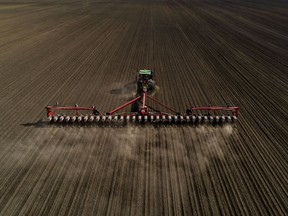With the right policies we can keep food prices down while saving the planet
Article content
The federal government’s “carbon tax,” which puts a price on greenhouse gas emissions, is often accused of exacerbating rising food costs. This is a mistake. Addressing both food insecurity and climate change must be national priorities and to suggest that we can only have affordability if we sacrifice the environment is a dangerous error.
Advertisement 2
Article content
Canadians are suffering from an affordability crisis that has pushed the cost of food out of the reach of millions. Food banks have been swamped and far too many households are unable to make ends meet. Fixing this goes beyond the grocery store; poverty is driven by many factors from low wages to expensive housing, and economy-wide inflation.
Article content
On the surface, fighting climate change seems like just another cost. One of the reasons we pollute so recklessly is that no one really pays for the environmental impact of fossil fuels, and we continually push the costs of ecological degradation into the future. This is why so-called “polluter pays” policies, which include placing a price on greenhouse gas emissions, are so important.
Article content
Advertisement 3
Article content
Hence, fighting climate change and battling inflation is sometimes seen as a zero-sum game where policies designed to protect the environment are passed onto consumers, driving up the cost of living.
A recent report by the Office of the Parliamentary Budget Officer that analyzed the federal fuel charge (e.g., a carbon tax) made this mistake in abundance. The authors pointed out that the federal fuel charge may hurt Canadians’ pocketbooks. But then they noted that their analysis “does not attempt to account for the economic and environmental costs of climate change.” And as such, this carbon pricing mechanism, which is an important policy designed to ensure that environmental problems are not ignored by the market, is cast as causing more harm than good.
Advertisement 4
Article content
There is an elegant solution to this apparent paradox. If we create financial incentives that reward farmers who adopt climate smart agricultural practices and technologies — sometimes called regenerative agriculture) — then producers across Canada will be compensated for becoming part of the climate change solution, while at the same time producing affordable nutrition for us all.
Recent reports by Royal Bank of Canada, Arrell Food Institute at the University of Guelph and the Boston Consulting Group suggest that by embracing alternative technological and management approaches, “Canada can cut up to 40 per cent of potential 2050 emissions.” But this will require creating financial incentives for farms and businesses to embrace climate-smart approaches to food production and processing.
Advertisement 5
Article content
Technologies that can help farmers and climate include anaerobic digesters that trap methane from manure and turn it into green natural gas. Next generation fertilizers are produced with less energy and help build up the soil’s organic matter. Using winter cover crops to protect the soil from erosion works in many (but not all) parts of the country. Vertical farms powered with renewable energy can replace polluting imports from water-stressed California. These technologies are the tip of the iceberg when it comes the tools we need to produce more food with fewer emissions.
And this is where another set of new initiatives comes into play. For instance, the Enhanced Soil Organic Carbon Protocol is a new tool that provides guidance on how different farming practices absorb greenhouse gases. And the recently announced Canadian Alliance for Net-Zero Agriculture brings together key public, academic, not-for-profit and private sector players to develop projects that will reward regenerative farming.
Advertisement 6
Article content
A common theme in this work is that adopting climate smart agri-food technologies won’t come for free. Our research suggests that for at least three or four years, most farmers will lose money if they buy the equipment or change their farming practices to absorb greenhouse gases. But over time, the research is clear: the payback period is relatively short and after a handful of growing seasons most farmers will be profiting from the switch. There is a need for policies and programs that put a price on pollution, help consumers manage rising costs and pay farmers for being part of the solution.
-

Green farming revolution is here, but we must help it grow
-

Our survival is at stake if our food system doesn’t change
-

Why otherwise honest Canadians are shoplifting groceries
Affordable food will not be affordable for long if it costs the earth, and we all need to understand that with the right policies we can keep food prices down while saving the planet. We can have our cake and climate action too.
Evan Fraser is director of the Arrell Food Institute at the University of Guelph and Lenore Newman is director of the Food and Agriculture Institute at the University of the Fraser Valley.
Food is too expensive, but don’t blame climate policy
2023-04-12 18:40:01











Comments
Postmedia is committed to maintaining a lively but civil forum for discussion and encourage all readers to share their views on our articles. Comments may take up to an hour for moderation before appearing on the site. We ask you to keep your comments relevant and respectful. We have enabled email notifications—you will now receive an email if you receive a reply to your comment, there is an update to a comment thread you follow or if a user you follow comments. Visit our Community Guidelines for more information and details on how to adjust your email settings.
Join the Conversation